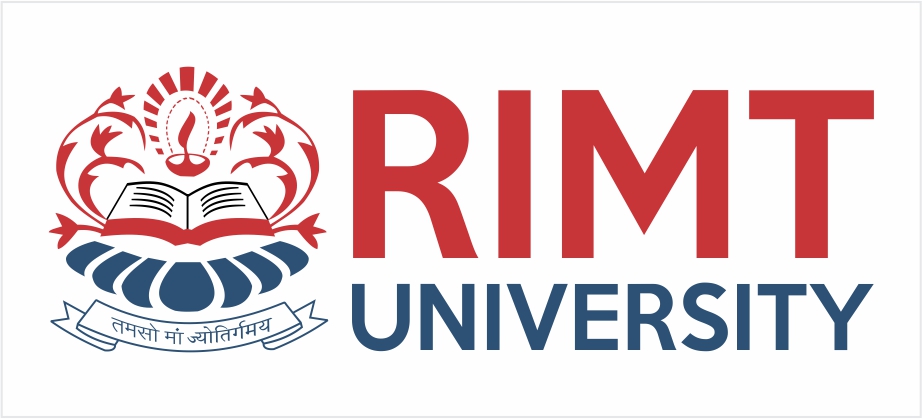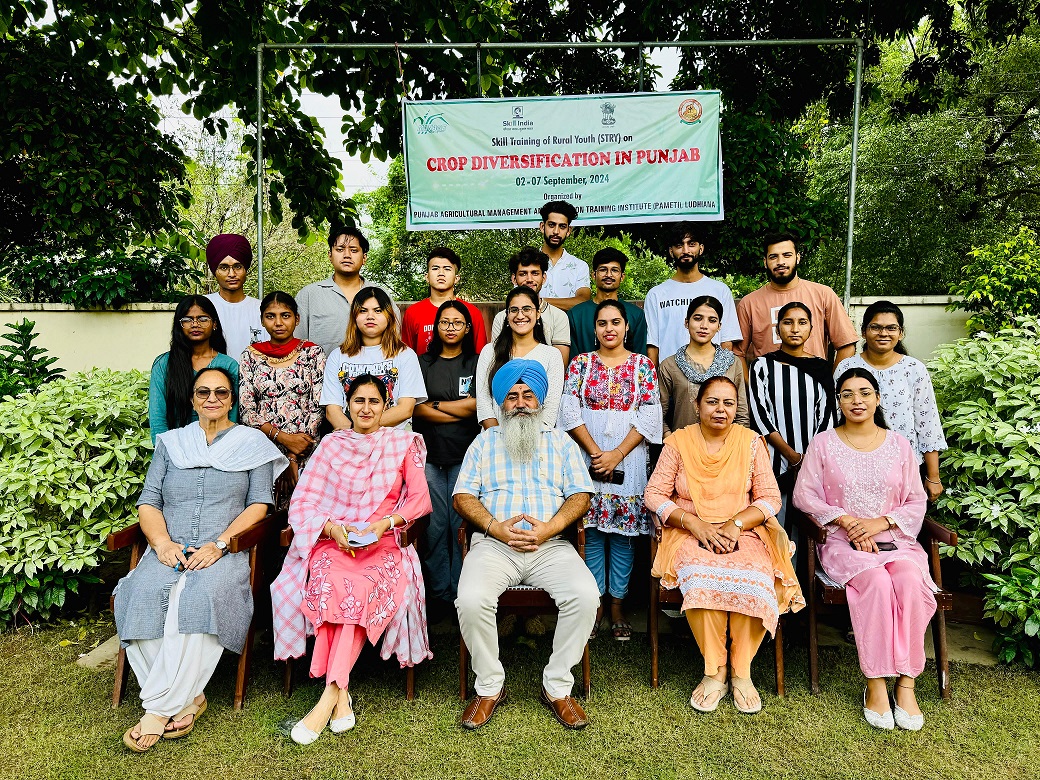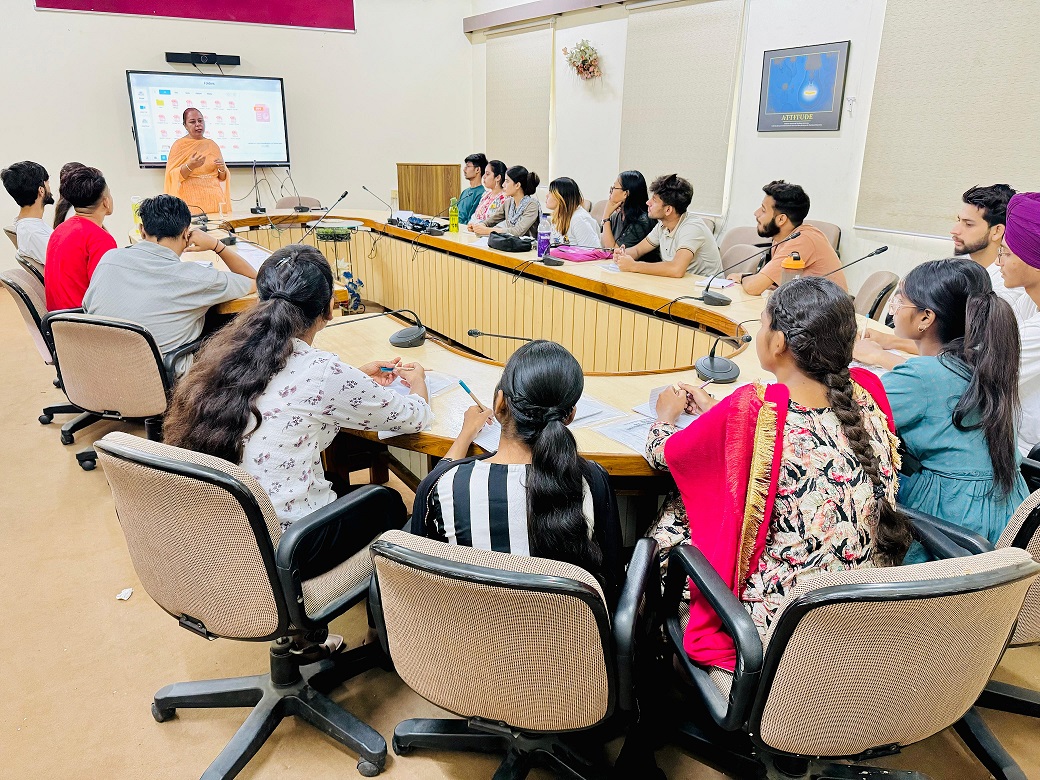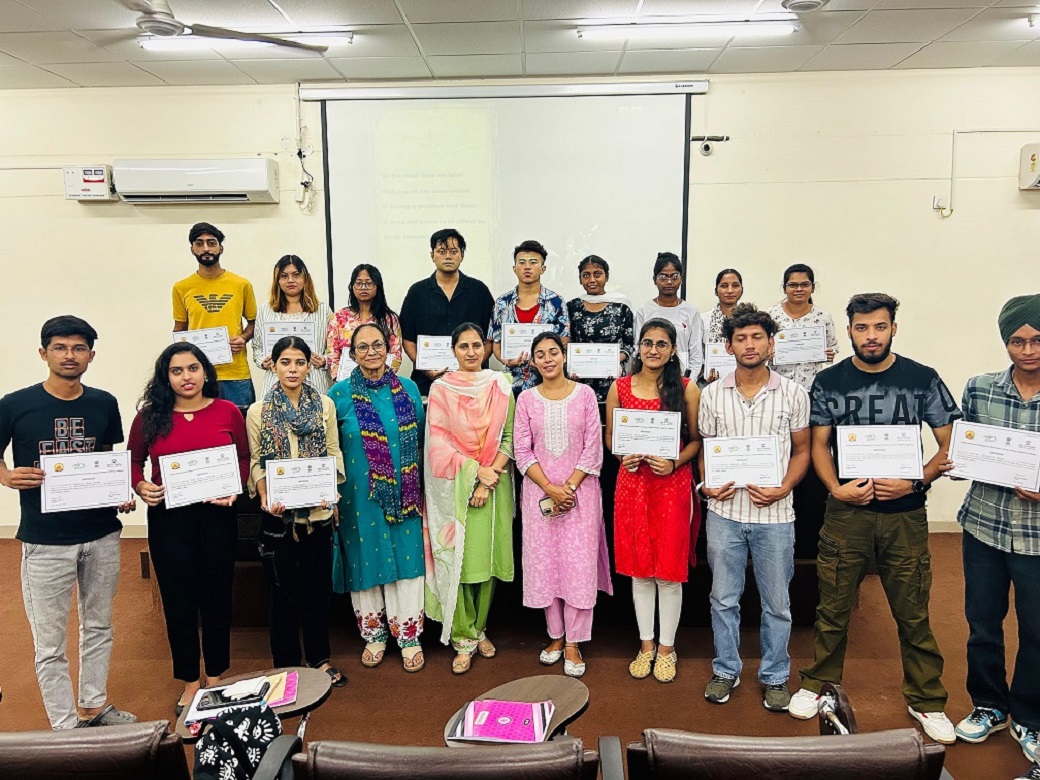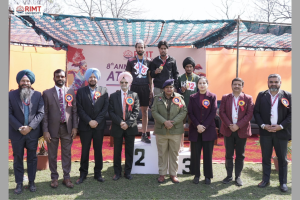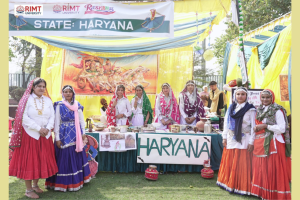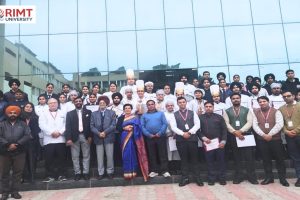RIMT University Agriculture Department Students Gain Expertise in Crop Diversification at PAMETI
The Punjab Agricultural Management and Extension Training Institute (PAMETI) organized an intensive one-week training program on crop diversification, focusing on various aspects of sustainable agriculture. Held from 2nd september, 2024 to 7th september, 2024, this program was tailored for B.Sc. Agriculture VII semester RAWE (Rural Agricultural Work Experience) students of RIMT University. The training covered a range of topics, including the effects of rice-wheat monoculture, Basmati cultivation, and alternative crops, aimed at equipping students with practical knowledge and skills for effective agricultural management.
Training Overview
The one-week training was designed to address the pressing issues related to crop diversification in Punjab, a region heavily reliant on rice-wheat monoculture. The curriculum was structured to provide both theoretical insights and practical experience across several key areas of crop diversification.
Day 1:
Effects of Rice-Wheat Monoculture on Soil Health and Remedies
The training commenced with an in-depth discussion on the effects of rice-wheat monoculture on soil health. Experts highlighted how continuous cultivation of these staple crops depletes soil nutrients, exacerbates soil erosion, and reduces biodiversity. The session, led by Dr. Gobinder Singh, Scientist, PAU emphasized the importance of soil health management practices and introduced remedies such as crop rotation, the use of organic fertilizers, and cover cropping to restore soil fertility.
Basmati Cultivation and Alternative Vegetable Crops
The second Lecture was dedicated to Basmati rice cultivation and the exploration of potential alternative vegetable crops in Punjab. Dr. Ranvir Singh Gill, Principal Rice breeder, PAU provided a comprehensive overview of Basmati cultivation practices, including soil requirements, pest management, and irrigation techniques. Additionally, the training covered alternative vegetable crops, such as spinach, carrots, and beans, which can diversify farm production and improve economic resilience.
Day 2:
Agro-Biodiversity in context of crop diversification
The second day focused on the need for crop diversification in Punjab, outlining the challenges faced by farmers, such as market uncertainties and climatic conditions. Dr. Balwinder lakhewal, Deputy Director, Extension, PAMETI, discussed agro-biodiversity and its role in enhancing farm resilience, promoting sustainable agricultural practices, and preserving genetic resources. Participants learned about integrating different crops and practices to build a more robust agricultural system.
Organic Farming, Integrated Farming Systems
The second day introduced organic farming as an alternative approach to conventional methods. The session, led by Dr. S.S. Walia, Director, School of Organic Farming, PAU, covered the principles of organic farming, including the use of organic inputs and techniques for managing soil fertility and pests. The day also included discussions on integrated farming systems (IFS), IFS were presented as a way to integrate crop and livestock production for increased sustainability.
Day 3: Reduce post harvest losses and food wastage
On the Third day of the training program, a dedicated session focused on reducing post-harvest losses and food wastage was held, offering valuable insights into these critical issues by Dr. M. S. Alam, Dr. Manpreet Kaur saini, Dr. Sandhya Dr, Surekha Bhatia, Dr. Gangandeep Kaur, and Dr. Rohit Sharma, from Department of Processing and Food Engineering, PAU. The session addressed the causes of post-harvest losses, such as inadequate storage facilities, poor handling practices, and pest infestations, and highlighted practical strategies to mitigate these losses. Participants learned about the importance of modern storage solutions, improved handling techniques, and integrated pest management to preserve the quality and quantity of harvested crops. Additionally, the training emphasized the role of innovative agroprocessing techniques and consumer awareness in reducing food wastage, underscoring the need for effective measures to enhance food security and resource efficiency.
Day 4: Cultivation of Pulses, Oilseeds, and Sugarcane
On the fourth day of the training program, participants delved into the cultivation of pulses, oilseeds, and sugarcane, gaining comprehensive insights into these crucial crops by Dr. Rajinder Singh, RRS, Kapurthala. The session provided an in-depth exploration of best practices for cultivating pulses such as lentils and chickpeas, which are vital for improving soil health and enhancing nutritional value. The training also covered oilseed crops like sunflower and soybean, focusing on their agronomic requirements and benefits for crop rotation. Additionally, participants learned about sugarcane cultivation, including soil preparation, pest management, and irrigation techniques essential for optimizing yield. The day combined theoretical knowledge with practical demonstrations, equipping students with the skills needed to successfully integrate these crops into diversified farming systems.
Day 5: Agroforestry and Intercropping
On the sixth day of the training program, participants engaged in a detailed session on agroforestry, intercropping, cultivation of groundnut and the potential of fruit crops for diversification, exploring these innovative practices as effective strategies for enhancing agricultural sustainability. The session, led by Dr. S.S. Manhas, Agronomist, PAU, provided insights into groundnut cultivation practices and the benefits of integrating fruit crops like citrus and pomegranates into farming systems. The training highlighted how agroforestry—integrating trees and shrubs with crops and livestock—can improve soil health, increase biodiversity, and provide additional income sources through timber and non-timber products. Intercropping was presented as a method to optimize land use, enhance crop productivity, and reduce pest and disease risks by growing complementary crops together. Through a combination of theoretical insights and practical examples, students learned how these systems can contribute to more resilient and productive farming operations while promoting environmental stewardship.
Day 6: Cultivation of Groundnut, Fruit Crops as Diversification, and Innovative Marketing Strategies
On the final day of the training program, a focused session by Dr. Harmeet Kaur Deputy Director, PAMETI and Dr. Rupinder Kaur, Deputy Director, PAMETI on agricultural marketing equipped participants with crucial knowledge and strategies for enhancing farm profitability through effective marketing practices. The training covered innovative marketing techniques, including the use of digital platforms and social media to reach broader markets and engage with consumers directly. Emphasis was placed on developing value-added products and leveraging cooperative models to strengthen market access. Students also explored case studies of successful marketing strategies and learned how to analyze market trends and consumer preferences to make informed decisions. This session provided practical tools and insights to help students support farmers in navigating the complexities of agricultural marketing and maximizing their economic returns.
Benefits to Students
The training program was highly beneficial for the RAWE students, providing them with a comprehensive understanding of crop diversification and its practical applications. Students gained hands-on experience, learned about modern agricultural practices, and developed skills in managing various aspects of crop production and marketing. The program equipped them with the knowledge needed to support farmers in implementing sustainable agricultural practices and addressing the challenges of crop diversification.
Conclusion
The one-week training on crop diversification organized by PAMETI was a valuable educational experience for the B.Sc. VII semester RAWE students. It offered a thorough exploration of critical topics related to sustainable agriculture, from soil health and organic farming to pest management and innovative marketing. The program successfully met its objectives, providing students with the knowledge and skills necessary to contribute effectively to the advancement of agriculture in Punjab. The practical insights and hands-on experience gained during the training will be instrumental in their future careers as agricultural professionals.
